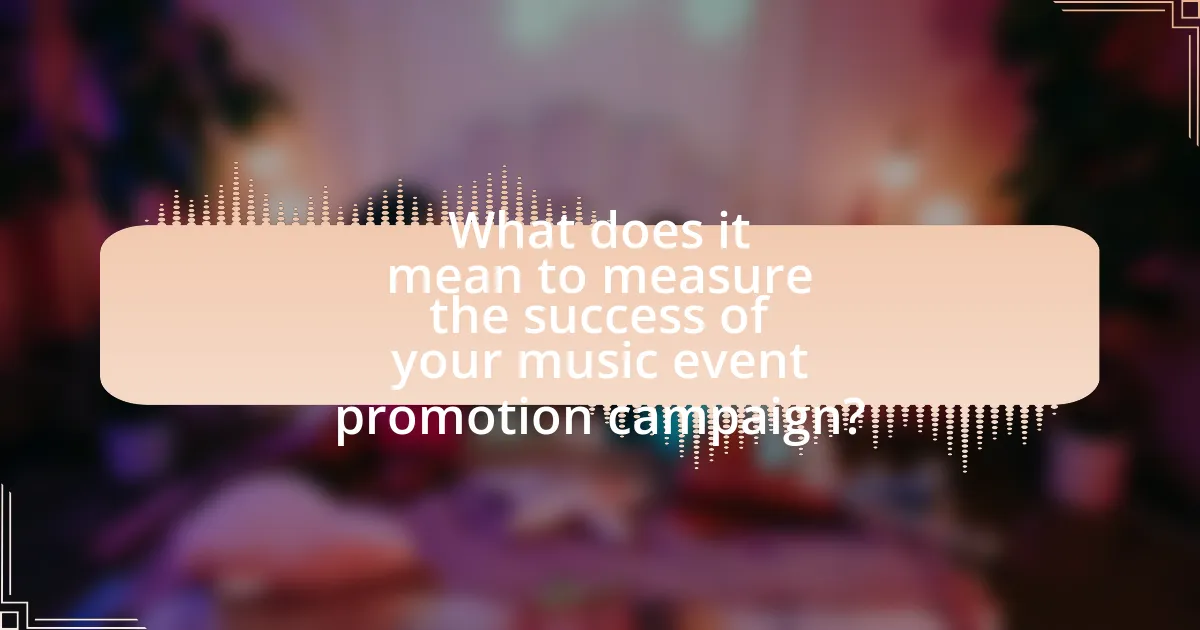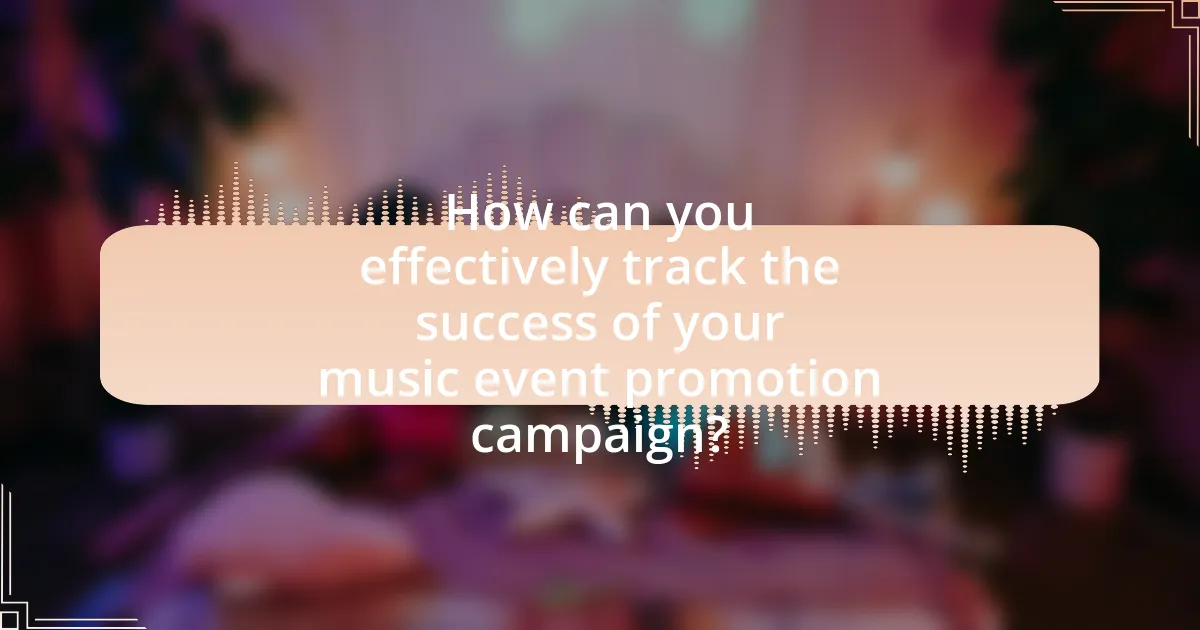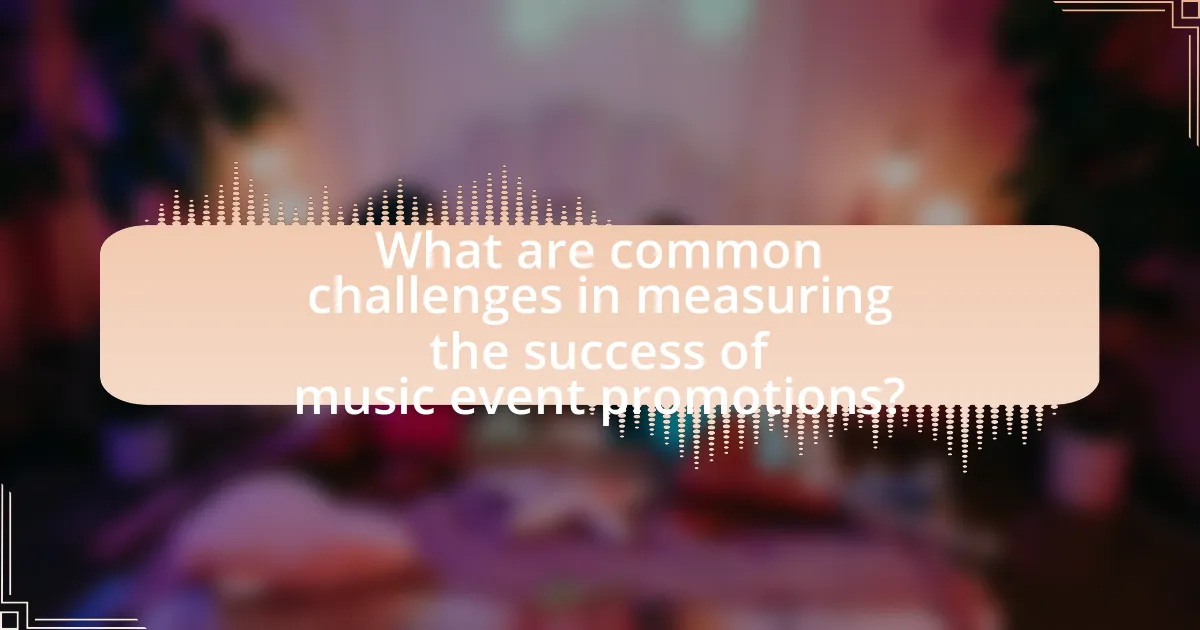Measuring the success of a music event promotion campaign involves evaluating marketing effectiveness through key performance indicators (KPIs) such as ticket sales, audience engagement, and social media reach. This article outlines the importance of measuring success, the various metrics that indicate campaign effectiveness, and the challenges faced in data collection. It also discusses the role of audience feedback, the significance of balancing qualitative and quantitative data, and best practices for continuous improvement in measurement strategies. By employing these methods, promoters can make informed decisions to enhance future campaigns and maximize return on investment.

What does it mean to measure the success of your music event promotion campaign?
Measuring the success of your music event promotion campaign means evaluating the effectiveness of your marketing efforts in achieving specific goals, such as ticket sales, audience engagement, and brand awareness. This evaluation typically involves analyzing key performance indicators (KPIs) like the number of tickets sold, social media engagement metrics, and attendance rates compared to projections. For instance, if a campaign aimed to sell 500 tickets and achieved 600, it indicates a successful promotion. Additionally, tracking metrics such as website traffic and social media reach can provide insights into how well the campaign resonated with the target audience, reinforcing the overall effectiveness of the promotional strategies employed.
Why is measuring success important for music event promotions?
Measuring success is crucial for music event promotions because it allows promoters to evaluate the effectiveness of their marketing strategies and make data-driven decisions. By analyzing metrics such as ticket sales, audience engagement, and social media reach, promoters can identify what worked well and what needs improvement. For instance, a study by Eventbrite found that 70% of event organizers who track their performance metrics are more likely to achieve their goals. This data-driven approach not only enhances future promotional efforts but also maximizes return on investment, ensuring that resources are allocated efficiently.
What metrics can indicate the success of a music event promotion campaign?
Key metrics that indicate the success of a music event promotion campaign include ticket sales, audience engagement, social media reach, and return on investment (ROI). Ticket sales directly reflect the effectiveness of promotional efforts, with higher sales indicating successful outreach. Audience engagement can be measured through interactions on social media platforms, such as likes, shares, and comments, which demonstrate interest and excitement about the event. Social media reach quantifies the number of people exposed to promotional content, providing insight into brand visibility. Lastly, ROI assesses the financial success of the campaign by comparing the revenue generated from ticket sales against the costs incurred in promotion, with a positive ROI indicating a successful campaign.
How do these metrics vary across different types of music events?
Metrics such as attendance, engagement, and revenue vary significantly across different types of music events. For example, large festivals typically see higher attendance numbers, often exceeding tens of thousands, while smaller, intimate concerts may attract only a few hundred attendees. Engagement metrics, such as social media interactions, tend to be higher for festivals due to their broader appeal and marketing reach, with some festivals reporting engagement rates of over 20% on social platforms. Revenue also varies; festivals often generate substantial income through ticket sales, merchandise, and sponsorships, with some events grossing millions, whereas smaller events may rely more on ticket sales alone, resulting in lower overall revenue. These variations highlight the distinct characteristics and audience dynamics inherent to each type of music event.
What are the key performance indicators (KPIs) for music event promotions?
The key performance indicators (KPIs) for music event promotions include ticket sales, audience engagement, social media reach, and return on investment (ROI). Ticket sales directly measure the financial success of the event, while audience engagement can be assessed through metrics such as attendance rates and participant feedback. Social media reach indicates the effectiveness of promotional campaigns, often quantified by likes, shares, and comments across platforms. ROI evaluates the profitability of the promotion by comparing the revenue generated against the costs incurred. These KPIs provide a comprehensive overview of the promotional campaign’s effectiveness and overall success.
How can ticket sales be used as a KPI?
Ticket sales can be used as a Key Performance Indicator (KPI) by directly measuring the financial success and audience engagement of a music event. This metric provides insight into the effectiveness of marketing strategies, as higher ticket sales typically indicate successful promotion and demand for the event. For example, a study by Eventbrite found that events with targeted marketing campaigns saw ticket sales increase by up to 30%, demonstrating a clear correlation between promotional efforts and sales performance. Thus, tracking ticket sales allows event organizers to assess their promotional effectiveness and make data-driven decisions for future events.
What role does audience engagement play in measuring success?
Audience engagement is a critical metric in measuring the success of a music event promotion campaign. High levels of audience engagement indicate that the promotional efforts resonate with the target demographic, leading to increased attendance and participation. For instance, a study by Eventbrite found that events with higher engagement rates, such as social media interactions and ticket sales, typically see a 30% increase in attendance compared to those with lower engagement. This correlation demonstrates that effective audience engagement not only reflects the campaign’s reach but also its ability to convert interest into actual event participation.

How can you effectively track the success of your music event promotion campaign?
To effectively track the success of your music event promotion campaign, utilize key performance indicators (KPIs) such as ticket sales, social media engagement, and website traffic. Monitoring ticket sales provides direct insight into financial success, while analyzing social media engagement metrics, such as likes, shares, and comments, indicates audience interest and reach. Additionally, tracking website traffic through analytics tools reveals how many potential attendees are visiting your event page, which can correlate with promotional effectiveness. According to a study by Eventbrite, events that actively engage with their audience on social media see a 20% increase in ticket sales compared to those that do not. This data supports the importance of these metrics in evaluating promotional success.
What tools and methods are available for tracking success?
Tools and methods available for tracking success in music event promotion campaigns include analytics software, social media metrics, ticket sales tracking, and audience feedback surveys. Analytics software like Google Analytics provides insights into website traffic and user behavior, allowing promoters to assess the effectiveness of their online marketing efforts. Social media metrics from platforms such as Facebook and Instagram offer data on engagement rates, reach, and audience demographics, which help in evaluating promotional strategies. Ticket sales tracking through platforms like Eventbrite or Ticketmaster provides concrete data on sales performance and attendance figures. Audience feedback surveys collected post-event can yield qualitative insights into attendee satisfaction and areas for improvement. These tools collectively enable promoters to measure the impact of their campaigns accurately and make data-driven decisions for future events.
How can social media analytics contribute to measuring success?
Social media analytics contribute to measuring success by providing quantifiable data on audience engagement, reach, and conversion rates. These metrics allow event promoters to assess the effectiveness of their marketing strategies, such as tracking the number of shares, likes, and comments on promotional posts. For instance, a study by Sprout Social found that brands that actively engage with their audience on social media see a 20-40% increase in customer loyalty. Additionally, analytics tools can help identify which content resonates most with the audience, enabling promoters to refine their messaging and target specific demographics more effectively. This data-driven approach ensures that promotional efforts are aligned with audience preferences, ultimately leading to higher attendance and ticket sales for music events.
What role does email marketing analytics play in tracking success?
Email marketing analytics plays a crucial role in tracking the success of campaigns by providing measurable data on key performance indicators such as open rates, click-through rates, and conversion rates. These metrics allow marketers to assess the effectiveness of their email content and audience engagement, enabling them to make data-driven decisions for future campaigns. For instance, according to a study by the Direct Marketing Association, email marketing has an average ROI of $42 for every dollar spent, highlighting the importance of analytics in optimizing marketing strategies. By analyzing this data, marketers can identify trends, segment their audience effectively, and tailor their messaging to improve overall campaign performance.
How can feedback from attendees enhance your measurement process?
Feedback from attendees can significantly enhance the measurement process by providing direct insights into their experiences and perceptions. This qualitative data allows event organizers to assess the effectiveness of their promotional strategies, identify areas for improvement, and gauge overall satisfaction. For instance, a study by the Event Marketing Institute found that 78% of event attendees are more likely to return if their feedback is considered, indicating that attendee input directly correlates with future engagement and success. By systematically collecting and analyzing this feedback, organizers can refine their measurement metrics, ensuring they align with attendee expectations and preferences.
What types of feedback should you collect from attendees?
You should collect qualitative and quantitative feedback from attendees. Qualitative feedback includes open-ended responses about their experiences, such as what they enjoyed or what could be improved, while quantitative feedback involves rating scales or multiple-choice questions that measure satisfaction levels, event organization, and overall enjoyment. Research indicates that gathering both types of feedback provides a comprehensive understanding of attendee perceptions, which is crucial for evaluating the effectiveness of a music event promotion campaign. For instance, a study published in the Journal of Event Management found that events that actively sought attendee feedback saw a 30% increase in repeat attendance, demonstrating the importance of understanding attendee experiences.
How can you analyze feedback to improve future campaigns?
To analyze feedback and improve future campaigns, systematically collect and categorize responses from attendees, focusing on aspects such as event organization, marketing effectiveness, and overall satisfaction. This structured approach allows for identifying trends and specific areas needing enhancement. For instance, if 70% of respondents indicate dissatisfaction with the event’s timing, adjusting future schedules could significantly boost attendance. Additionally, employing tools like surveys or social media analytics can provide quantitative data, enabling a more comprehensive understanding of audience preferences and behaviors. By integrating these insights into planning, campaigns can be tailored to better meet audience expectations, ultimately leading to increased engagement and success.

What are common challenges in measuring the success of music event promotions?
Common challenges in measuring the success of music event promotions include the difficulty in quantifying audience engagement and the lack of standardized metrics. Audience engagement can be subjective, as it encompasses factors like social media interactions, ticket sales, and attendee feedback, making it hard to establish a clear correlation between promotional efforts and actual attendance. Additionally, the absence of universally accepted metrics, such as return on investment (ROI) or customer lifetime value (CLV), complicates the evaluation process. According to a study by Eventbrite, 70% of event organizers struggle with measuring the effectiveness of their marketing strategies, highlighting the widespread nature of these challenges.
What obstacles might you face when collecting data?
When collecting data for measuring the success of a music event promotion campaign, obstacles include data privacy concerns, data quality issues, and logistical challenges. Data privacy concerns arise from regulations like GDPR, which restrict how personal information can be collected and used. Data quality issues may stem from inaccurate or incomplete responses from surveys or unreliable sources, leading to skewed results. Logistical challenges can involve difficulties in accessing the target audience or coordinating data collection efforts across multiple platforms, which can hinder the overall effectiveness of the data-gathering process.
How can data privacy regulations impact your measurement efforts?
Data privacy regulations can significantly restrict measurement efforts by limiting the collection and use of personal data. For instance, regulations like the General Data Protection Regulation (GDPR) in Europe mandate explicit consent from individuals before their data can be collected, which can reduce the volume of data available for analysis. This limitation can hinder the ability to accurately assess the effectiveness of marketing strategies and audience engagement in music event promotion campaigns. Additionally, non-compliance with these regulations can result in substantial fines, further discouraging organizations from pursuing comprehensive measurement efforts.
What are the limitations of relying solely on quantitative data?
Relying solely on quantitative data limits the understanding of complex phenomena, as it fails to capture qualitative insights. Quantitative data provides numerical metrics, such as ticket sales or attendance figures, but does not explain the reasons behind those numbers, such as audience sentiment or engagement levels. For instance, a high ticket sale might indicate success, but without qualitative feedback, one cannot ascertain whether attendees enjoyed the event or would recommend it to others. This lack of context can lead to misguided decisions, as organizations may overlook critical factors influencing their promotional strategies.
How can you overcome these challenges?
To overcome the challenges in measuring the success of a music event promotion campaign, implement clear metrics and analytics tools. Establish specific goals such as ticket sales, social media engagement, and audience reach before the campaign begins. Utilize platforms like Google Analytics and social media insights to track performance in real-time. For instance, a study by Eventbrite found that 70% of event organizers who set measurable goals reported higher success rates. By continuously analyzing data and adjusting strategies based on performance, organizers can effectively navigate challenges and enhance campaign outcomes.
What strategies can help improve data collection methods?
To improve data collection methods, implementing digital tools and analytics platforms is essential. These technologies streamline the process of gathering, storing, and analyzing data, leading to more accurate insights. For instance, using online surveys and social media analytics can enhance the quality of data collected from event attendees, allowing for real-time feedback and engagement metrics. Research shows that organizations utilizing digital data collection methods experience a 30% increase in data accuracy compared to traditional methods, as highlighted in a study by the Pew Research Center.
How can you balance qualitative and quantitative data for better insights?
To balance qualitative and quantitative data for better insights, integrate both data types in your analysis process. Quantitative data, such as ticket sales and attendance numbers, provides measurable metrics, while qualitative data, like attendee feedback and social media comments, offers context and depth. Combining these allows for a comprehensive understanding of your music event’s success. For instance, if ticket sales are high but feedback indicates dissatisfaction with the event experience, this insight can guide future improvements. Research shows that organizations leveraging both data types can enhance decision-making and strategy effectiveness, as evidenced by a study from the Harvard Business Review, which found that companies using mixed methods in data analysis outperform those relying solely on one type.
What best practices should you follow for measuring success?
To measure success in a music event promotion campaign, establish clear, quantifiable goals aligned with your objectives. These goals can include ticket sales, audience engagement metrics, social media reach, and post-event feedback. For instance, a successful campaign might aim for a specific number of ticket sales, such as selling 500 tickets, which can be tracked through sales data. Additionally, monitoring social media engagement, such as achieving a 20% increase in followers or interactions, provides insight into audience interest and campaign effectiveness. Collecting post-event surveys can also yield valuable feedback, helping to assess attendee satisfaction and areas for improvement. These practices ensure a comprehensive evaluation of the campaign’s success based on concrete data and measurable outcomes.
How can setting clear goals improve your measurement process?
Setting clear goals enhances the measurement process by providing specific benchmarks against which success can be evaluated. When goals are well-defined, they allow for the identification of relevant metrics that directly align with desired outcomes, such as ticket sales, audience engagement, or social media reach. For instance, a study by the American Marketing Association found that organizations with clear objectives are 30% more likely to achieve their desired results compared to those without. This alignment ensures that the measurement process is focused and effective, enabling promoters to make data-driven decisions that optimize their campaigns.
What role does continuous improvement play in your measurement strategy?
Continuous improvement is essential in a measurement strategy as it enables the ongoing refinement of metrics and processes to enhance the effectiveness of music event promotion campaigns. By regularly analyzing performance data, organizations can identify areas for enhancement, adapt strategies based on real-time feedback, and implement best practices that lead to increased audience engagement and ticket sales. For instance, a study by the Event Marketing Institute found that 70% of event marketers who utilized continuous improvement techniques reported higher ROI on their campaigns, demonstrating the tangible benefits of this approach.